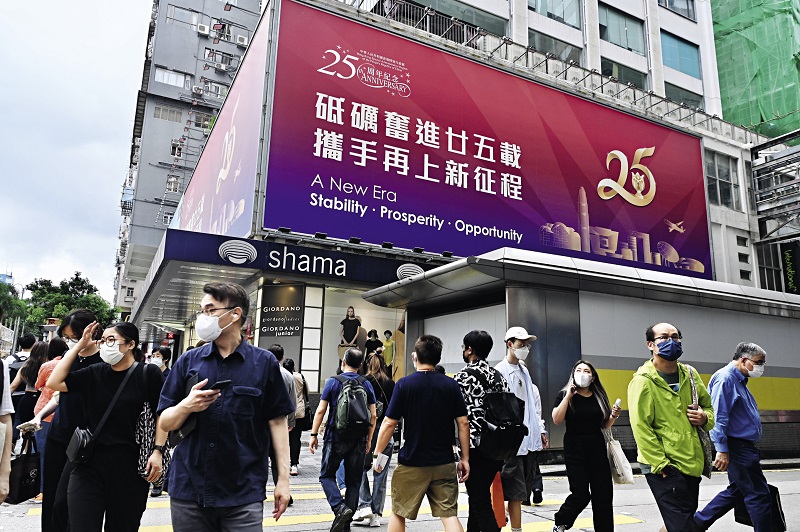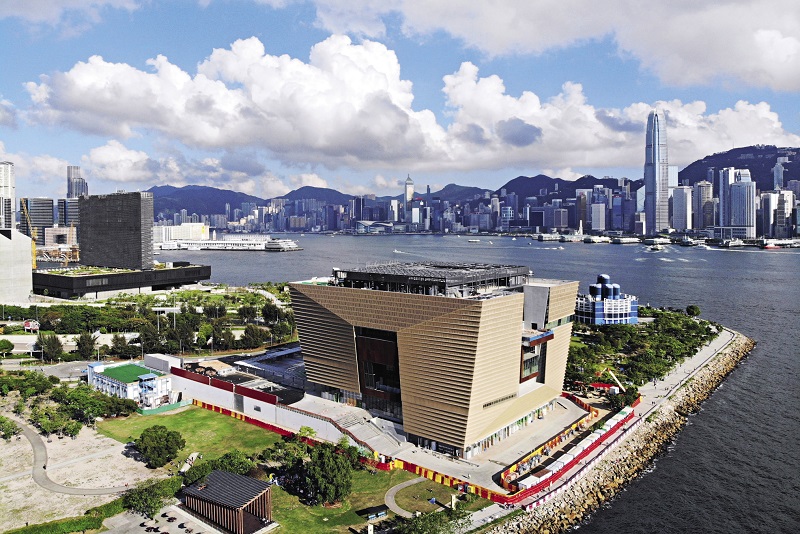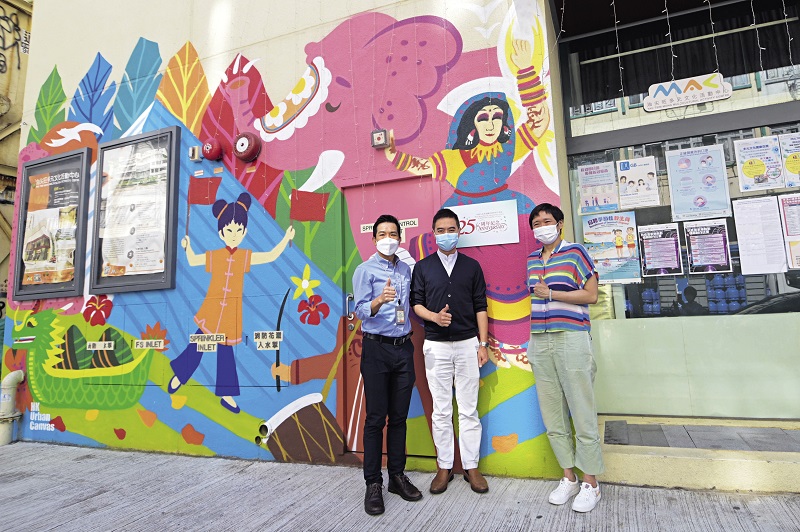Having stood up to the challenges and seized opportunities since its return to the motherland, Hong Kong has risen even stronger and become more vibrant.
Twenty-five years ago, the Union Jack, the national flag of the United Kingdom (U.K.), was lowered at Hong Kong’s Government House, and the five-starred red flag of the People’s Republic of China (PRC) was raised. This marked the ending of British colonial rule over China’s Hong Kong, a humiliating chapter in the history of the Chinese nation. As Hong Kong returned to the open arms of its motherland after 156 years of colonial rule, the Chinese government resumed the exercise of sovereignty over Hong Kong, and began to govern the place as a special administrative region.
Over the past 25 years, with the strong support of the mainland, Hong Kong Special Administrative Region (HKSAR) has gained sound social and economic development.

A series of activities celebrating the 25th anniversary of Hong Kong’s return to the motherland are held in Hong Kong on June 15, 2022. Celebration posters are displayed in many places along the streets of Hong Kong. This picture is taken in Tsim Sha Tsui.
Successful Practice of “One Country, Two Systems”
There is no ready-made experience in implementing the “one country, two systems” policy. Challenges are inevitable, but how to respond to and resolve them provides a chance to demonstrate the strong vitality and resilience of the policy.
Over the past 25 years, the central government has fully, faithfully, and unswervingly implemented the principles of “one country, two systems,” “Hong Kong people administering Hong Kong,” and a high degree of autonomy. It has firmly safeguarded China’s sovereignty, security and development interests, and ensured long-term peace, stability, and prosperity in Hong Kong. The people of Hong Kong are now enjoying more extensive democratic rights and freedom under the “one country two systems” policy than they ever did previously.
The election of the sixth-term chief executive of the HKSAR government has been held ahead of the 25th anniversary of Hong Kong’s return. On May 8, candidate John Lee won the election with an overwhelming 1,416 votes, more than 99 percent of the total votes. Lee’s winning reflects Hong Kong people’s will and ushers in a new chapter for “patriots administering Hong Kong.”
“I earnestly look forward to seeing Hong Kong as a city brimming with vibrancy, as a community in which everyone is happy, as a society that is highly open, as a place which embraces unity, and as a home which provides stability and safety,” Lee said when announcing his candidacy for the six-term chief executive election in April. For the vision, he set focus of future policies on three main areas. The first is to resolve various deep-seated issues based on a result-oriented approach. The second is to increase the overall competitiveness of Hong Kong. The third is to consolidate a firm foundation for Hong Kong’s development.
Later in his election manifesto, Lee placed emphasis on four broad tenets of improving governance capabilities to tackle pressing livelihood issues, boosting land and housing supply, enhancing Hong Kong’s overall competitiveness on the global stage, and building a caring, inclusive society that values youth development.
Responsibilities of Patriots in Hong Kong
There is no unified model of democracy in the world. A democracy that is based on a country’s reality and could settle real problems is a good one. The new electoral system in Hong Kong is based on the constitutional order in the HKSAR formed by the Constitution and the Basic Law. Hong Kong’s political, economic, social, cultural, and historical conditions were taken into account when devising the system amid efforts to explore a path to democracy with Hong Kong characteristics.
Practice is the sole criterion for testing truth. Facts amply showed that Hong Kong’s new electoral system is a good system that conforms to the principle of “one country, two systems” and is grounded in Hong Kong’s reality.
The strength of the system lies in the strict implementation of the principle of “patriots administering Hong Kong,” which makes sure that competent patriots can be elected to govern Hong Kong. Hong Kong is a special administrative region of the PRC, and the power to administer the region must stay in the hands of patriots. Criteria for patriots are clear-cut and objective. They are those who sincerely safeguard national sovereignty, security, and development interests, respect and champion the fundamental system of the country and the constitutional order of the HKSAR, and do their best to maintain Hong Kong’s prosperity and stability.
In the next five years, the new HKSAR government will shoulder the grand responsibility of carrying forward the “one country, two systems” policy faithfully and fully.

A view of West Kowloon Cultural District with the Hong Kong Palace Museum in the foreground and M+ Museum on the left.
Strongest Support From the Central Government
During the past 25 years, Hong Kong has gone through a lot: the Asian financial crisis in 1997, the SARS epidemic in 2003, the international financial turmoil in 2008, the illegal Occupy Central movement in 2014, the 2019 extradition bill event, and the ongoing COVID-19 epidemic. Despite these challenges, Hong Kong has maintained overall stable development, which is inseparable from the strong support of the motherland.
The 1997 Asian financial crisis dealt a heavy blow to economies across Asia. With the strong support of the central government, the HKSAR government waged a battle to defend the Hong Kong dollar and Heng Seng Index against speculative attacks by American billionaire investor George Soros. At the critical moment back in August 1998 when the Hong Kong financial market was on the verge of collapse, the central government stepped forward and took every measure possible to maintain the prosperity and stability of Hong Kong. The timely help protected the linked exchange rate system between the Hong Kong dollar and the U.S. dollar, successfully thwarting international speculators’ attacks.
In 2003, the SARS outbreak hit the mainland and Hong Kong at the same time. The central government made every effort to provide much-needed medicine and protective equipment free of charge to Hong Kong. Thanks to the solidarity and strength of the local residents in Hong Kong and assistance by the mainland, the outbreak was finally brought under control after a few months.
In 2008, when Hong Kong was affected by the international financial crisis, the central government promptly introduced 14 measures in seven areas to promote financial and economic cooperation. The support boosted confidence, alleviated pressing difficulties facing the people, and revitalized the economy. In 2011, the central government issued 36 more policies to help boost Hong Kong’s development.
In September 2014, when some planned the illegal Occupy Central movement, the central government, adhering to its policy of “one country, two systems” and the law, gave full support to the HKSAR government. This enabled the HKSAR government to properly settle the 79-day illegal activities, effectively safeguarding the interests of Hong Kong.
Again in 2019, Hong Kong suffered from a series of turbulences in the wake of a proposal to amend the region’s extradition law. Some foreign and overseas forces made use of the situation and interfered in Hong Kong affairs. Their actions seriously jeopardized Hong Kong’s economic prosperity and social stability, posed a serious threat to national security, and more importantly, challenged the bottom line of the “one country, two systems” principle. Faced with the situation, the central government took action in firm support of the HKSAR chief executive, the HKSAR government, and the police in cracking down on violent clashes, bringing violence and chaos to an end. Normal order was restored eventually.
The COVID-19 epidemic that broke out in 2020 has continued till this day. This year, in particular, the HKSAR government was overwhelmed by the “double envelopment” of Delta and Omicron variants. At the critical moment, the central government extended a helping hand to Hong Kong by introducing a series of measures, the results of which greatly boosted Hong Kong people’s confidence in fighting the epidemic.
At every critical moment the HKSAR faced, the central government was there, ready to give support. The experience in tackling the challenges has helped Hong Kong to gain a deeper understanding of how to fully and faithfully implement the “one country, two systems” policy and the Basic Law.
Seeking Stability and Prosperity
Hong Kong is a sacred and inalienable part of China, and Hong Kong affairs are China’s internal affairs, which brooks no interference by any external forces.
Against a backdrop of international landscape undergoing changes unseen in a century, Hong Kong is facing unprecedented challenges and
opportunities.
Activities attempting to destabilize Hong Kong were rampant in recent years. Those who opposed China colluded with external hostile forces. In the name of striving for “democracy,” they were trying to split the country and subvert the government. Their real purpose was to turn Hong Kong into a forefront of Color Revolution. The acts endangered national security, and undermined Hong Kong’s prosperity and stability.
These destabilizing forces sabotaged the rule of law, social stability, the economy, and people’s livelihood in Hong Kong. Community facilities were horribly vandalized, malls and shops smashed and burned, and innocent citizens besieged and hurt.
The U.K. colonialized Hong Kong for over a century, during which there was no democracy to Hong Kong people. However, the British always shunned from this period of history, and turned a blind eye to the successful practice of “one country, two systems.” They distorted facts, confused right and wrong, and made indiscreet remarks or criticisms about Hong Kong affairs.
At the critical juncture in the HKSAR’s fight against the COVID-19 pandemic, the British didn’t show respect and concern for Hong Kong citizens, but instead engaged in political manipulation. The former colonist continued releasing so-called “six-monthly reports on Hong Kong,” and used shameless and despicable methods to slander the rule of law in Hong Kong and mislead people. Its hypocrisy and sinister intentions are self-evident.
The U.S. is the biggest behind-the-scenes manipulator in undermining Hong Kong’s prosperity and stability. Its ultimate intention is to contain China. The Fact Sheet: U.S. Interference in Hong Kong Affairs and Support for Anti-China, Destabilizing Forces published by the Chinese Ministry of Foreign Affairs exposed its gross violation of international law and basic norms of international relations, and wanton interference in China’s internal affairs. Consisting of 102 items in five categories, the document listed the time, locations, persons, processes and methods of the U.S. interference in Hong Kong affairs.
A deep look into the official website of the U.S.-funded National Endowment for Democracy (NED) showed that it has been funding opposition organizations and media outlets in Hong Kong since 1994, and manipulated them to carry out various demonstrations and protests. Since 2003, the NED had organized, planned, directed and channeled funds behind the scenes for illegal activities in Hong Kong, such as the Occupy Central movement and violent demonstrations against the extradition bill.
China’s State Council Information Office issued the white paper Hong Kong: Democratic Progress under the Framework of One Country, Two Systems on December 20, 2021. The white paper presented a comprehensive review on the origin and development of democracy in the HKSAR, along with the principles and position of the central government.
While ignoring their own countries’ poor performance on democracy, freedom, and human rights, some people from Western countries repeatedly made irresponsible remarks about Hong Kong. The real purpose is to contain China by playing the “Hong Kong card.” These ungrounded accusations cannot shake the will of the Chinese government to fully and faithfully implement the “one country, two systems” policy. They will not stop Hong Kong from exploring a democratic path that is suitable to its conditions, recovering from chaos and realizing stability and prosperity.
Any attempts to disrupt Hong Kong and curb China’s development are doomed to fail.

On May 19, 2022, Hong Kong’s first mural on the theme of ethnic integration was unveiled at Yau Tsim Mong Multicultural Activity Centre.
Progress and Prosperity
Return to the motherland brought Hong Kong new opportunities.
Benefiting from the “one country, two systems” policy, Hong Kong is presented with new opportunities as the country is advancing the Belt and Road Initiative and building the Guangdong-Hong Kong-Macao Greater Bay Area.
An urban agglomeration consisting of Hong Kong, Macao, and nine cities in the Pearl River Delta region is formed in the Greater Bay Area. It is one of the largest and most competitive bay areas worldwide. Compared with the San Francisco Bay Area, New York Bay Area and Tokyo Bay Area, the Guangdong-Hong Kong-Macao Greater Bay Area boasts the highest GDP growth rate, and the largest land area and population.
Hong Kong enjoys many favorable conditions for growth and unique competitive advantages. In particular, China’s continuous and rapid development in recent years has provided Hong Kong with rare opportunities, inexhaustible impetuses and broad space for development.
Hong Kong is the world’s largest offshore RMB business center, processing more than 70 percent of all RMB payments. The balance of RMB deposits in Hong Kong had increased nearly 133-fold from RMB 6.298 billion in May 2004 to RMB 841.9 billion in April 2022.
Hong Kong is also a two-way service platform for China to bring in overseas investment and go global, and an important offshore fund-raising center for Chinese enterprises. As of April 2022, there were 1,370 mainland companies listed in the Hong Kong stock exchange, accounting for 53.3 percent of the total number of companies listed on the exchange and 77.7 percent of the exchange’s total market value.
The 14th Five-Year Plan (2021-2025) has clearly stated that the country will continue to support Hong Kong in enhancing its status as an international financial, shipping and trade center, strengthen its role as a global offshore RMB business hub, international asset management and risk management center, and support it in enhancing its status as an international aviation hub, and in building itself as an international innovation and technology center, a regional intellectual property trading center, as well as a hub for arts and cultural exchanges between China and the rest of the world.
More than three-quarters of the world’s top 100 banks and 15 of the world’s 20 largest private equity funds have set up branches in Hong Kong. Many are regional headquarters.
Hong Kong has been rated an economy with the highest level of economic freedom in the world for 25 consecutive years by the Canadian Fraser Institute. Its annual economic freedom of the world report measures the degree of economic freedom in five broad areas of size of government, legal system and property rights, sound money, freedom to trade internationally, and regulation. Hong Kong ranked first in freedom to trade internationally and regulation in the latest 2021 report.
Hong Kong is the financial center of Asia. In this year’s Global Financial Centers Index report released by Z/Yen Group, a London-based think tank, and the China Development Institute in Shenzhen, Hong Kong remained the third place in the ranking.
Hong Kong also boasts the most competitive workforce in Asia. According to the World Talent Ranking 2021 published by the International Institute for Management Development in Lausanne, Switzerland, Hong Kong ranked first in Asia, up three places from its 2020 spot.
The rich and diverse food culture is also a distinctive footnote of this international city. There are more than 600,000 non-Chinese people living in Hong Kong. Among them are foreign businesspeople, foreign laborers and new immigrants. They have brought cultural diversity, vitality and global perspectives to the city’s development. Since its return to China, Hong Kong has become more international, attracting people from all over the world.
The destiny of Hong Kong has always been entwined with that of the Chinese mainland. It has achieved stability and embarked on a new journey to prosperity. People expect Hong Kong to give full play to its unique advantages, better integrate into the overall development of the country, maintain long-term prosperity and stability, and continuously enhance its competitiveness as a special administrative region.
Over the last 25 years, the great practice of “one country, two systems” has achieved universally recognized success in Hong Kong. At a new starting point, the policy is poised to exhibit its even stronger vitality and unleash greater potential. The future of Hong Kong will be even brighter!
KANG KAI is a special commentator of China Today.